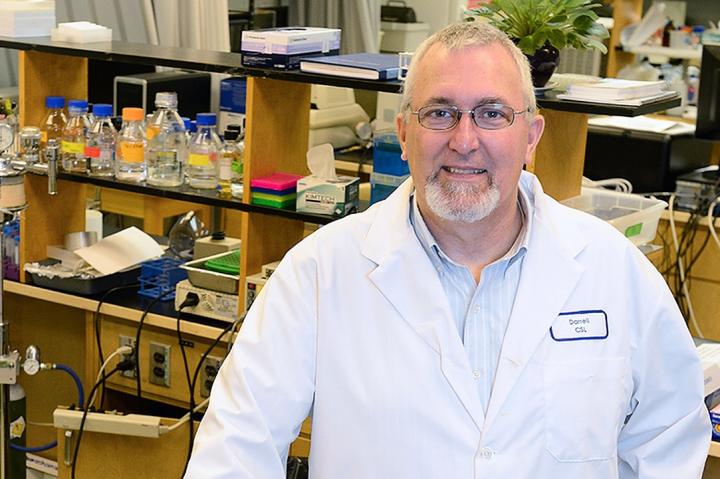
Credit: University of Saskatchewan
Findings from a new study on Alzheimer’s disease (AD), led by researchers at the University of Saskatchewan (USask), could eventually help clinicians identify people at highest risk for developing the irreversible, progressive brain disorder and pave the way for treatments that slow or prevent its onset.
The research, published in the journal Scientific Reports in early January, has demonstrated that a shorter form of the protein peptide believed responsible for causing AD (beta-amyloid 42, or Aβ42) halts the damage-causing mechanism of its longer counterpart.
“While Aβ42 disrupts the mechanism that is used by brain cells to learn and form memories, Aβ38 completely inhibits this effect, essentially rescuing the brain cells,” said molecular neurochemist Darrell Mousseau, professor in USask’s Department of Psychiatry and head of the Cell Signalling Laboratory.
Previous studies have hinted that Aβ38 might not be as bad as the longer form, said Mousseau, but their research is the first to demonstrate it is actually protective.
“If we can specifically take out the Aβ42 and only keep the Aβ38, maybe that will help people live longer or cause the disease to start later, which is what we all want.”
Aβ42 is toxic to cells, disrupts communication between cells, and over time accumulates to form deposits called plaques. This combination of factors is believed responsible for causing AD. Experts have long thought that all forms of Aβ peptides cause AD, despite the fact that clinical trials have shown removing these peptides from the brains of patients does not prevent or treat the disease.
Mousseau said the idea behind the study was simple enough: If two more amino acids is bad, what about two less?
“We just thought: Let’s compare these three peptides, the 40 amino acid one that most people have, the 42 amino acid that we think is involved in Alzheimer’s, and this 38 one, the slightly shorter version,” said Mousseau, who is Saskatchewan Research Chair in Alzheimer disease and related dementias, a position co-funded by the Saskatchewan Health Research Foundation and the Alzheimer Society of Saskatchewan.
The project confirmed the protective effects of the shorter protein across a variety of different analyses: in synthetic versions of the protein in test tubes; in human cells; in a worm model widely used for studying aging and neurodegeneration; in tissue preparations used to study membrane properties and memory; and in brain samples from autopsies. In the brain samples, they also found that men with AD who had more Aβ42 and less Aβ38 died at an earlier age. The fact that they didn’t see this same pattern in samples from women suggests the protein peptide behaves differently in men and women.
The USask team also included Maa Quartey and Jennifer Nyarko from the Cell Signalling Lab (Department of Psychiatry), Jason Maley at the Saskatchewan Structural Sciences Centre, Carlos Carvalho in the Department of Biology, and Scot Leary in the Department of Biochemistry, Microbiology and Immunology. Joseph Buttigieg at the University of Regina and Matt Parsons at Memorial University of Newfoundland were also part of the research team.
While Mousseau wasn’t surprised to see that the shorter form prevents the damage caused by the longer version, he said he was a little taken aback at how significant an effect it had.
“As soon as you put Aβ38 into it, it brings it back up to control levels, completely inhibiting the toxic effects of Aβ42. That’s what was pleasantly surprising.”
###
Media Contact
Victoria Dinh
[email protected]
Original Source
https:/
Related Journal Article
http://dx.




